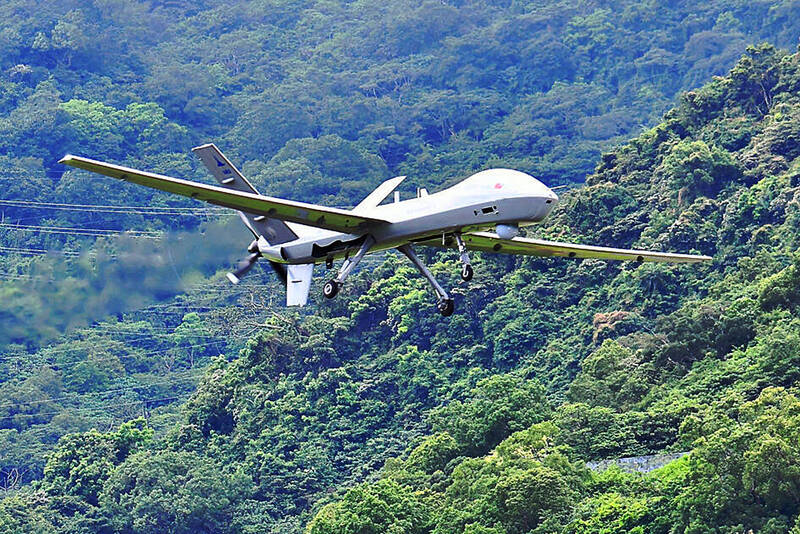The Ministry of National Defense plans to use a proposed aerospace and uncrewed aerial vehicle (UAV) industry campus to produce military drones, a defense official said yesterday.
The campus in Chiayi County’s Minsyong Township (民雄) would receive nearly NT$6.9 billion (US$216.12 million) to build factories, hangars and UAV testing facilities, the ministry’s budget proposal submitted last month to the Legislative Yuan showed.
The Chungshan Institute of Science and Technology, the ministry’s research and development arm, is to oversee the project, it said.

Photo: Yu Tai-lang, Taipei Times
Speaking on condition of anonymity, the defense official said the information disclosed by the report suggested that the campus would serve as the production center for drones, the military value of which has rapidly increased in the past few years.
The Teng Yun 2 (騰雲二型, “Cloud Rider 2”) and the Albatross II (銳鳶二型), the nation’s domestically developed medium-altitude long-endurance military drones, have passed operational tests, the official said, adding that the Teng Yun 2 last month participated in a live-fire precision-guided munition exercise.
The Albatross II reportedly performed well in the drills, although the armed forces have yet to issue a contract for mass production of the drone, they said.
The Chien Hsiang (劍翔, “Rising Sword”), a loitering munitions drone that targets radar systems, is believed to be slated for mass production next year, and would be funded through the regular budgetary process rather than the Sea-Air Combat Power Improvement Plan, they said.
The navy has also proposed a budget for the Hung Chueh 3 (紅雀三型, “Cardinal 3”) project to address flaws with its predecessor, the Hung Chueh 2 (紅雀二型), such as a lack of target designation capabilities, training simulators and dedicated trainer drones, the official said.
The Executive Yuan approved the drone budgets one day after approving a high-profile warship and submarine budget, which shows the urgency and importance that it has placed on improving the capabilities of the military’s UAVs, they said.
In May, the Cabinet approved the Five Trusted Industry Sectors development plan targeting chips, artificial intelligence, defense, security and surveillance, and next-generation communications.
The plan’s defense component includes funds to boost the nation’s UAV design and production capabilities with an emphasis on establishing supply chains outside of China, it said at the time.
The Executive Yuan’s 2028 targets for the drone industry include increasing the sector’s value 10-fold to NT$30 billion and a surge production capability of 15,000 systems a month.

SECURITY: As China is ‘reshaping’ Hong Kong’s population, Taiwan must raise the eligibility threshold for applications from Hong Kongers, Chiu Chui-cheng said When Hong Kong and Macau citizens apply for residency in Taiwan, it would be under a new category that includes a “national security observation period,” Mainland Affairs Council (MAC) Minister Chiu Chui-cheng (邱垂正) said yesterday. President William Lai (賴清德) on March 13 announced 17 strategies to counter China’s aggression toward Taiwan, including incorporating national security considerations into the review process for residency applications from Hong Kong and Macau citizens. The situation in Hong Kong is constantly changing, Chiu said to media yesterday on the sidelines of the Taipei Technology Run hosted by the Taipei Neihu Technology Park Development Association. With

CARROT AND STICK: While unrelenting in its military threats, China attracted nearly 40,000 Taiwanese to over 400 business events last year Nearly 40,000 Taiwanese last year joined industry events in China, such as conferences and trade fairs, supported by the Chinese government, a study showed yesterday, as Beijing ramps up a charm offensive toward Taipei alongside military pressure. China has long taken a carrot-and-stick approach to Taiwan, threatening it with the prospect of military action while reaching out to those it believes are amenable to Beijing’s point of view. Taiwanese security officials are wary of what they see as Beijing’s influence campaigns to sway public opinion after Taipei and Beijing gradually resumed travel links halted by the COVID-19 pandemic, but the scale of

A US Marine Corps regiment equipped with Naval Strike Missiles (NSM) is set to participate in the upcoming Balikatan 25 exercise in the Luzon Strait, marking the system’s first-ever deployment in the Philippines. US and Philippine officials have separately confirmed that the Navy Marine Expeditionary Ship Interdiction System (NMESIS) — the mobile launch platform for the Naval Strike Missile — would take part in the joint exercise. The missiles are being deployed to “a strategic first island chain chokepoint” in the waters between Taiwan proper and the Philippines, US-based Naval News reported. “The Luzon Strait and Bashi Channel represent a critical access

Pope Francis is be laid to rest on Saturday after lying in state for three days in St Peter’s Basilica, where the faithful are expected to flock to pay their respects to history’s first Latin American pontiff. The cardinals met yesterday in the Vatican’s synod hall to chart the next steps before a conclave begins to choose Francis’ successor, as condolences poured in from around the world. According to current norms, the conclave must begin between May 5 and 10. The cardinals set the funeral for Saturday at 10am in St Peter’s Square, to be celebrated by the dean of the College